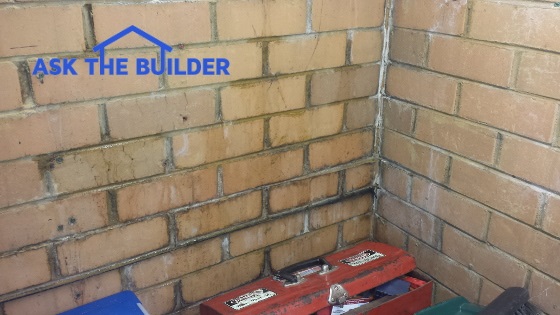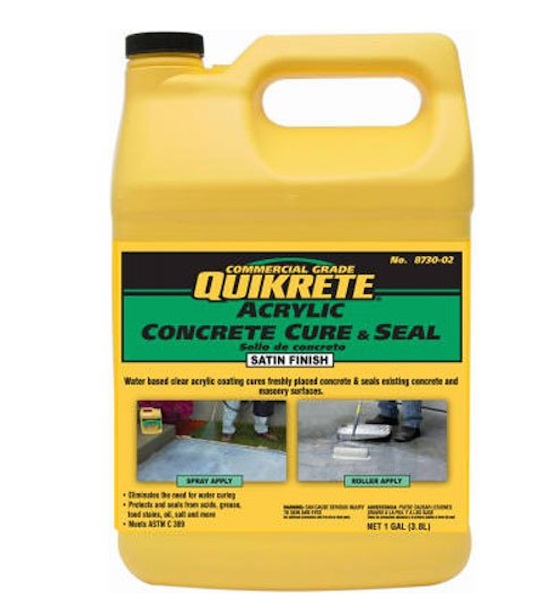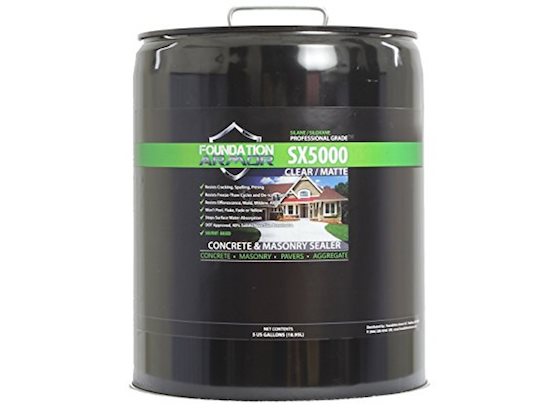Brick Wall Leakage Repair

Water is leaking right through the tight mortar joints between these brick. Photo credit: Goran Latkovic
Brick Wall Leakage Repair TIPS
- Water can't pool against brick walls
- Create positive drainage using a thin concrete overlay
- Use cement paint for permanent repair - WATCH VIDEOS below
- Silane-siloxane sealers can prevent water from entering brick
- CLICK HERE to Get Tim's FREE & FUNNY Newsletter!
DEAR TIM: There's an area in our garage that's leaking water. The water is coming from the brick wall which is causing a small amount of flooding when heavy rain.
Outside there are steps that lean against the this wall. It appears there has been some concrete or some form of elastic that has been used to patch this issue by the previous owners.
What can we do to stop the leakage and if we decide we can't do the work ourselves, who would have the best skills to complete the job? Goran L., Liverpool, New South Wales, Australia
DEAR GORAN: I'm sorry to see you've got this leakage problem, but it's comforting to know that gravity and physics work the same down under in Australia as it does here in North America! With that in mind, I'm confident I can help you achieve a nice dry garage.
Negative Drainage
Based on your description, there are at least two dynamics in play here. First, you say that the steps are leaning towards the outer wall. This means that water is being directed right at the wall. I happen to call this negative drainage.
This is unacceptable and must be changed. You have no hope for success if the contact point between the steps and brick wall is like a small river valley where the water flows when it rains.
Free & Fast Bids
Wind-Driven Rain
The second issue you're dealing with could be wind-driven rain assuming this wall is open to the weather and rain does hit the wall. Rain showers are often not the problem.
Brick walls take on water in powerful gusty rainstorms. When rain blows against brick walls like the golfing-in-the-lightning-storm scene in the funny movie Caddyshack, water can pour through a brick wall like it enters a sinking ship.
Raindrops Like A Hammer
The best way to visualize how water would get through a seemingly solid masonry wall is to think about how nails are hammered into wood. Each time you strike a nail with a hammer, it penetrates deeper into the wood. Think of each raindrop that strikes a brick-wall mortar joint as both a hammer and a nail.
Weight Of Water Is Significant
When the first drop hits the mortar, it soaks in just a bit. When the second drop hits where the first one did, it pushes the first raindrop water a little farther into the mortar.
Each successive pounding raindrop pushes the one before it deeper into the wall. Before long, you have water streaming down the inner side of the brick wall just as you show in your photograph.
Step One - Positive Drainage
Here's how I'd solve your problem. I'm going to assume you have some sturdy concrete steps that can't be lifted so they tilt away from the wall. If this is the case, then you're going to have to do a wedge-shaped overlay of concrete and cement stucco mix to make each stair tread slope away from the brick wall with a minimum one-eighth-inch fall per foot.
The overlay mixture where it's over 3/4-inch thick must contain small pieces of stone no larger than a green pea that you'd eat for dinner. As the wedge of overlay gets thinner, use just very coarse sand in the mix. At it's thinnest point, the sand should be quite fine.
Add plenty of Portland cement to the mix so it bonds well with the existing concrete. When you're mixing in the gravel, add three parts gravel, two parts sand and two parts Portland cement. When you're not using any stone, just mix two parts sand to one part Portland cement.
Secret Cement Paint
Be sure the concrete steps are clean and just before applying the overlay mixture, spritz the concrete with clear water to get it damp and then paint on a layer of cement paint. Cement paint is just a mixture of Portland cement and water that is blended to the consistency of regular paint.
Concrete Repair & Cement Paint Videos
Watch these three videos to see how to mix up the repair compounds.
Concave Shape - No Pooling
Where the overlay contacts the brick wall, I'd add a little extra to give it a concave shape like the inside of a shallow bowl. This means the overlay mixture laps up onto the brick for about three-quarters of an inch. You create this so the water running down the steps in a storm never contacts the brick wall.
Curing Compound For Permanent Repair
As soon as you finish the surface of the overlay so it looks good, spray it with a concrete curing compound so it dries slowly. This is very important so the overlay never separates from the older concrete.

This is a typical concrete curing compound. They're liquid you spray or roll onto stiff concrete. CLICK THE PHOTO TO SEE A VARIETY OF THESE AMAZING LIQUID PLASTIC MATERIALS. THEY DRY CLEAR.
Step Two - Repair Mortar & Sealant
The second phase of the repair job is inspecting the outer mortar joints for missing mortar. Be sure the mortar joints between the brick are in great shape and repair as necessary.
Once you have the mortar in great shape, apply a silane-siloxane brick water repellent to the entire brick wall. Pay close attention to the written instructions with respect to air temperature and the amount of water repellent to apply.

This is a magnificent silane - siloxane water repellent that soaks into concrete. CLICK THIS IMAGE NOW TO ORDER IT.
Some products require two coats but the second coat must be applied within a few minutes of the first coat. If the instructions say this, be sure you follow these instructions to the letter.
The reason for this is simple. If the first coat dries, it repels the second coat! Remember, the sealant is much like the raindrops and you need it to penetrate as deep as possible into the mortar joints to prevent water from entering your garage.
Featured in April 21, 2015 AsktheBuilder Newsletter.
Column 1088
6 Responses to Brick Wall Leakage Repair